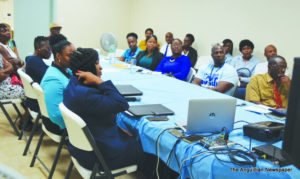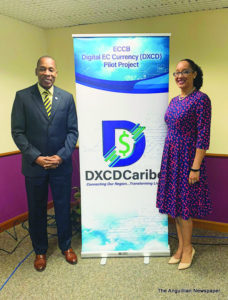
On Thursday, October 10th, a video conference hosted by the Eastern Caribbean Central Bank (ECCB) was held at the Disaster Management Headquarters. The conference was simulcast across the eight-member countries of the Eastern Caribbean Currency Union (ECCU), and its purpose was to introduce the logo for the Union’s digital currency brand — as well as to give an update to finance professionals, and invited attendees, on ECCB’s plan to introduce a pilot project for the implementation of digital currency which would be soon used as an alternative to cash.
The digital currency logo was presented and described by Mrs. Andrea Gilbert-Bullen, Senior Administrative Officer of the ECCB Headquarters in St. Kitts. It is dubbed DXCDCaribe with the tagline “Connecting Our Region…Transforming Lives”. Mrs. Gilbert-Bullen explained: “This logo was inspired by the bank’s strategic vision of financial innovation. It was designed to reflect the bank’s strategic intent for digital transformation.
“The graphical icon captured by the letter D was specially designed to embody digital currency. The clean lines of the D complement the solid and strong face which is symbolic of the strength of the EC currency.
“The dollar sign at the heart of the D underscores the fact that financial stability is the pillar ECCU’s foundation. The angular lines are a visual representation of the eight ECCU countries, forging ahead on the path towards digital transformation. The left to right direction of the lines denotes a progressive movement towards this goal.

“The colors blue, black and green signify trust, strength and growth, and are colors commonly used in the financial industry. The name “DXCDCaribe” embodies both a digital currency and Caribbean ethos. The tagline “Connecting Our Region…Transforming Lives” mirrors the bank’s strategic focus of transformation through collaboration. Together, these three elements: the icon, name and tagline represent the ECCU’s roadmap for transformation.”
The move towards digital currency began last February when a contract was signed between the ECCB and a Barbados-based fintech company called Bitt Inc. The contract provided for Bitt Inc. to conduct a block-chain currency pilot project within the ECCU—and the movement towards digital is hailed as the first of its kind in the world.
Consequently, the eight-member countries of the ECCU, which include Anguilla, Antigua and Barbuda, Commonwealth of Dominica, Grenada, Montserrat, St Kitts and Nevis, Saint Lucia, and St Vincent and the Grenadines, are poised to be the first to benefit from the ability to use their smartphones to spend or transfer money that represents cash without the use of card, card information, or conventional paper notes.
In the words of the Governor of the ECCB, Mr. Timothy Antoine, “This is not an academic exercise. Not only will the digital EC Dollar be the world’s first digital legal tender currency to be issued by a central bank on block-chain, but this pilot is also a live Central Bank Digital Currency (CCDC) deployment with a view to an eventual phased public rollout.
“The pilot is part of the ECCB’s Strategic Plan 2017-2021 which aims to help reduce cash usage within the ECCU by 50 percent. It will promote greater financial sector stability, and expedite the growth and development of our member countries. It would be a game-changer for the way we do business”.
At Thursday’s video conference, Governor Antoine further promoted the deployment of digital currency by asking a few poignant questions: “Why are we doing this? Why is ECCB investing so much time, money and energy in this digital currency project? Why should you care about this project? Why should you partner with us and support our move from paper and polymer to digital?
“ECCB’s digital currency makes your money more secure, accessible and provides an innovative, real-time payment instrument that you can rely on. This is the 21st century. We are 36 years into our journey at the Central Bank, and our currency is one of the strongest in the world. So what we could be doing with our currency must occupy our minds as we contemplate our future development.”
He made the observation that payments provide the lifeblood of an economy and that the DXCDCaribe pilot initiative is a key step in the building of a digital economy which is a necessity for the transformation of the ECCU. He noted that the transformation of the ECCU in all of its spheres, including a payment system, involves innovation, and that the transformation of the payment system of the ECCU requires a strong eco-system of partners, innovators and influencers.
– Staff Reporter, James R. Harrigan







